A complete “what to pack for Greece” guide, covering all four seasons. Based on our personal experience of living and traveling in Greece for several decades!
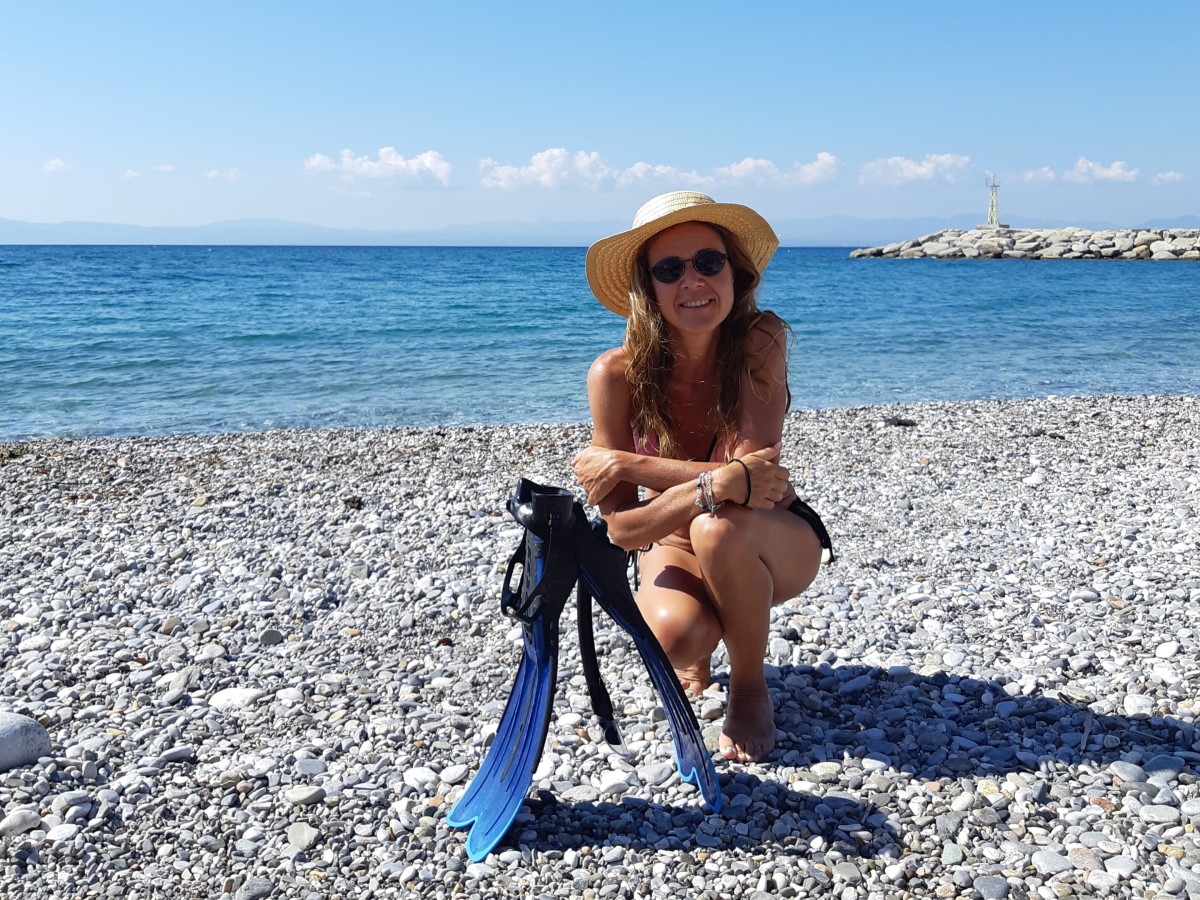
Packing for a Greek vacation
What you need to pack for Greece will depend on the time of year you travel! Greece is a country with 4 seasons, rather than a tropical destination. It will also depend on where exactly in Greece you are going, and what you are planning to do.
Most people take a Greek vacation in summer. However, the numbers of travelers who visit in the shoulder season are on the rise. Plus, thousands of digital nomads choose Greece as their base.
In this article, I will break down the items you need to pack for Greece for each season. I have included sections on clothes, shoes, personal items, and anything extra you might need.
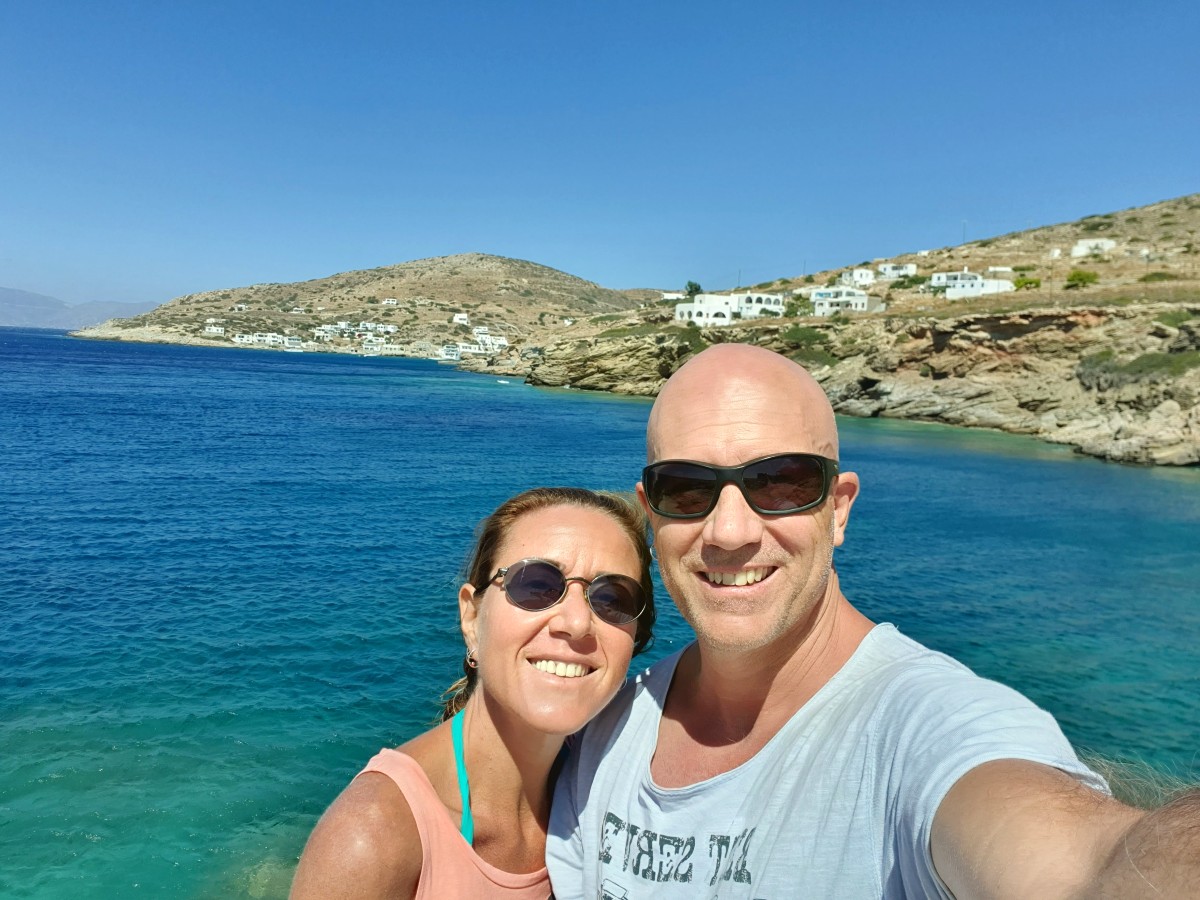
Just to introduce myself quickly! I am Vanessa from Athens in Greece, and my partner Dave is from the UK. We live in Athens and travel extensively around Greece for 3-4 months a year. This article is based on our own experiences.
Let’s start with a quick overview of the weather in Greece.
What is the weather like in Greece?
Greece has a so-called Mediterranean climate. This means that our summers are hot and dry, while our winters are relatively mild and wet.
I’ll say this again: Greek summers are HOT. We get the warmest weather from mid-June to mid-September, and temperatures usually peak in the summer months, July and August.

Chania, Crete, in June
During the summer, daytime temperatures here in Athens can easily go over 35C / 95F. In recent years, we’ve seen highs of around 43C / 110F, and it was quite unbearable.
The islands and countryside tend to be a little cooler, but are still warm by most people’s standards.
Greek summers are not humid like in tropical countries, so you generally won’t have to worry about sudden thunderstorms. You will actually find that locals welcome summer rain, after long periods of drought.
During spring and autumn, the weather in Greece can be a little hit and miss. There may be warm days and cool nights, plus some rainy / windy days here and there.

Voidomatis River, North Greece, in February
Finally, winter weather in Greece is generally considered mild by most people. That said, we do get lots of rain and snow. It CAN get quite chilly, especially up in North Greece, where temperatures can drop to -20C / -4F!
Let’s start with what to wear in Greece during summer, which is the most popular time to visit.
What to pack for a summer trip in Greece and the Greek islands
When it comes to packing for Greece in summer, things are fairly straightforward. Hat, sunglasses, swimsuit, a few lightweight clothes, walking shoes, beach bag, and you’re done!
My best advice for packing is this phrase: pack light. Try to fit everything in a carry-on if you can.

Ithaca in July
Also, think about what you are likely to do. As an example, if you are most interested in our gorgeous beaches and nature, you will need loose, light-colored clothes.
If your main aim is to go partying and clubbing every night, you will want to bring a selection of clothes to choose from. Still, it’s possible to pack light, especially if you plan your outfits in advance.
Let’s break things down.
Bring lightweight clothes for summer in Greece
Given that daytime is hot, your Greece packing list for summer should mostly include light clothing.
Men will be fine with some t-shirts and a few pairs of shorts or lightweight pants / trousers.

Milos in June
Summer dresses, light tops, and shorts or skirts are the best choice for ladies. You can always style them with some accessories and jewelry.
As a rule, you can easily get by in casual clothes. If you enjoy visiting places off the beaten track, like we do, you won’t even need any proper evening outfits.
With that said, what to wear in Greece also depends on your type of vacation. If you are going to upscale restaurants, bars and clubs on islands like Mykonos or Santorini, definitely bring a few stylish clothes.

A wedding in September
Smart trousers and a nice buttoned shirt will work for men. Ladies will be fine in short or maxi dresses, or tops and capri trousers, and some nice accessories.
Do I need any warm clothes for summer in Greece?
Even though our summers are warm, I suggest that you bring a couple of warmer clothes. A long-sleeved jacket and a pair of long trousers or leggings for ladies may come in handy.
We have many air-conditioned spaces, including museums, airports and, most importantly, ferries.
I always need a jacket when we are travelling on the Greek ferries, as the air-conditioning can be ridiculously cold. Some people don’t seem to care, but it doesn’t hurt to bring one.
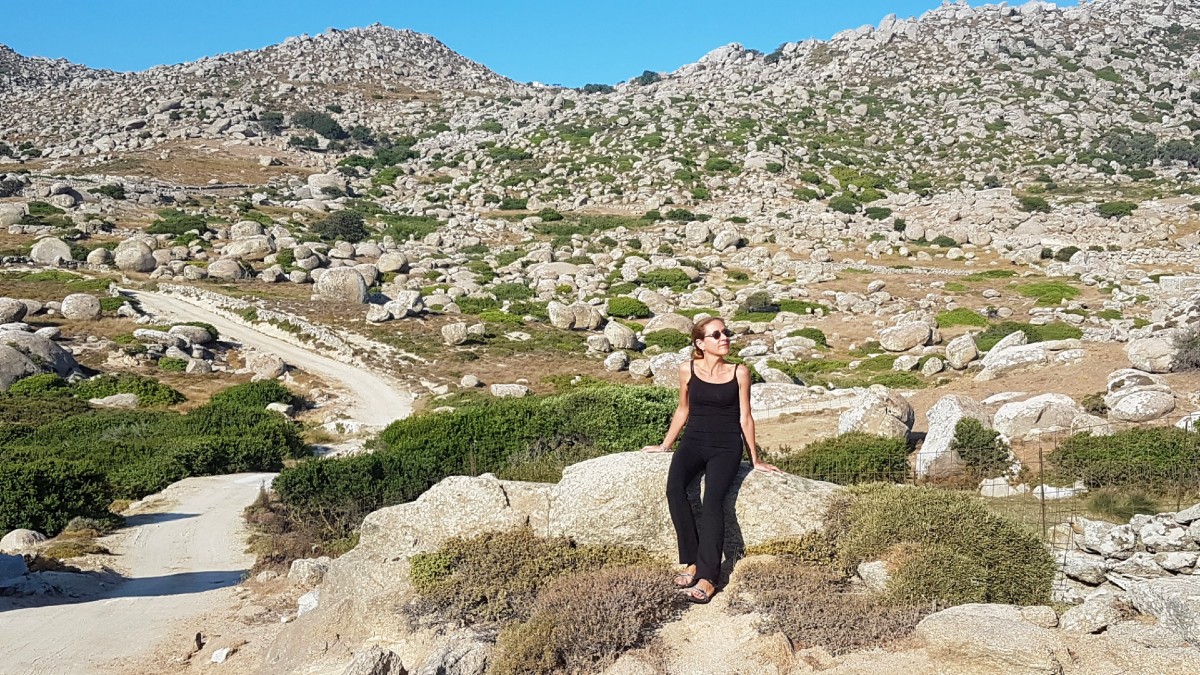
Tinos in September
The islands can be a bit breezy as well, so bring something to throw around your shoulders. And if you are going to any of our mountain villages, definitely bring a few warmer clothes.
Don’t forget your swimsuit
Swimsuits are the absolute beach essentials for Greece. If you are a beach enthusiast like me, you may end up wearing a swimsuit for most of your time.
When it comes to women’s swimsuits, pretty much anything goes in Greece. Some ladies, especially from the US, have commented that our bikinis are on the skimpy side.
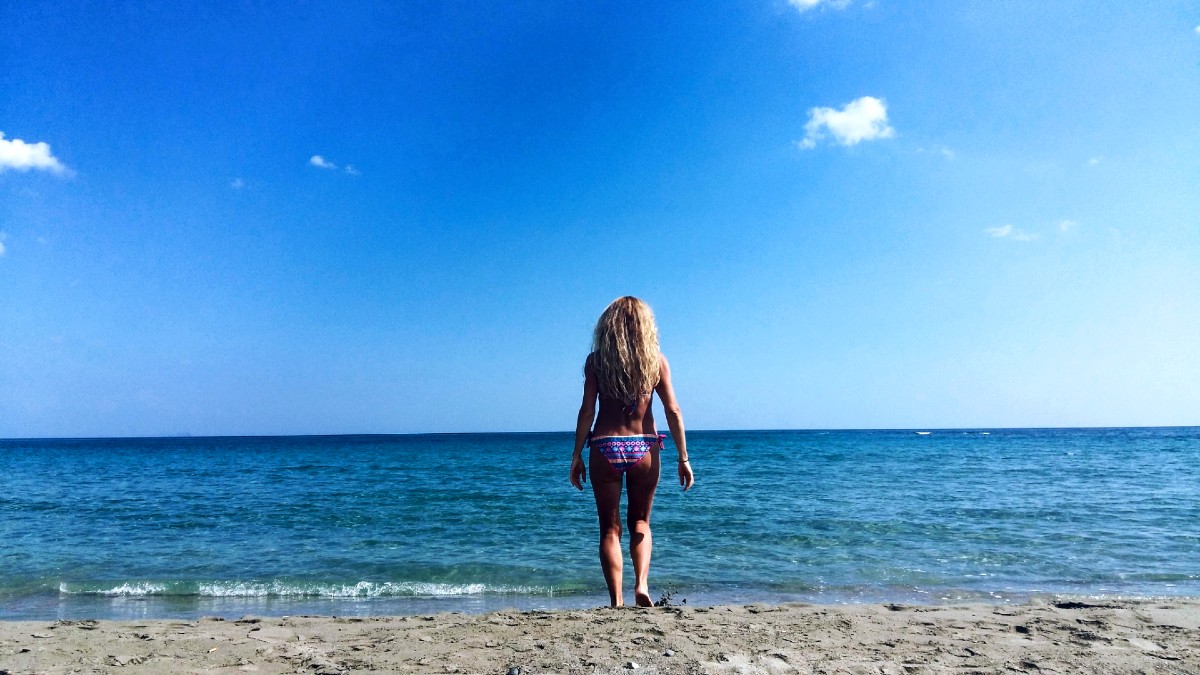
Summer in Greece
While they are not nearly as tiny as Brazilian bikinis, they tend to be smaller than swimsuits you can get in other European countries. So you might prefer to bring your favorite swimsuit from home, along with a nice beach dress or two, or a cover up skirt.
Note: If you are taking a volcano and hot spring cruise in Santorini, avoid bringing your favorite white or light-colored bikini. Bring a darker or older swimsuit which you won’t mind getting stained.
Men’s swimwear comes in many shapes and forms, but you will never see any really long ones in Greece. Speedos are still fairly popular, especially with the older generations, which some people find amusing. Just bring normal men’s swimming shorts, and you’ll be fine.

The Cyclades in September
It’s also important to know that we have many beaches and coves where a swimsuit is optional. Usually (but not always), they are a bit out of the way.
What to wear in monasteries in Greece
Another thing to consider as you are packing is our religious culture and our thousands of churches and monasteries.
When you visit any of them, please be respectful. Avoid short and skimpy clothes, and definitely do not try to enter in your bikini.

Meteora Monasteries in April
Visitors should be prepared in advance for any religious sites, such as the Meteora Monasteries. While there are usually wrap skirts that you can borrow at the monasteries, you can’t always bank on it.
Women would need to wear a long skirt, or perhaps bring a wrap-around sarong that you can wear over the clothes you are wearing already. Also, if you are wearing a tank top, please bring a shawl to cover up your shoulders.
Men should wear trousers that cover the knee, or otherwise they might not be allowed to enter. I’ve seen this happen in one of the Meteora Monasteries.
Best shoes for summer in Greece for women
What shoes to pack for Greece depends on your personal preferences, activities, and style of travel. One thing is certain though – you will walk a fair amount when you visit Greece.
My favorite summer walking shoes for Greece since I first discovered them in 2007 are Teva sandals. They have pretty good cushioning and are great to wear for most uses.
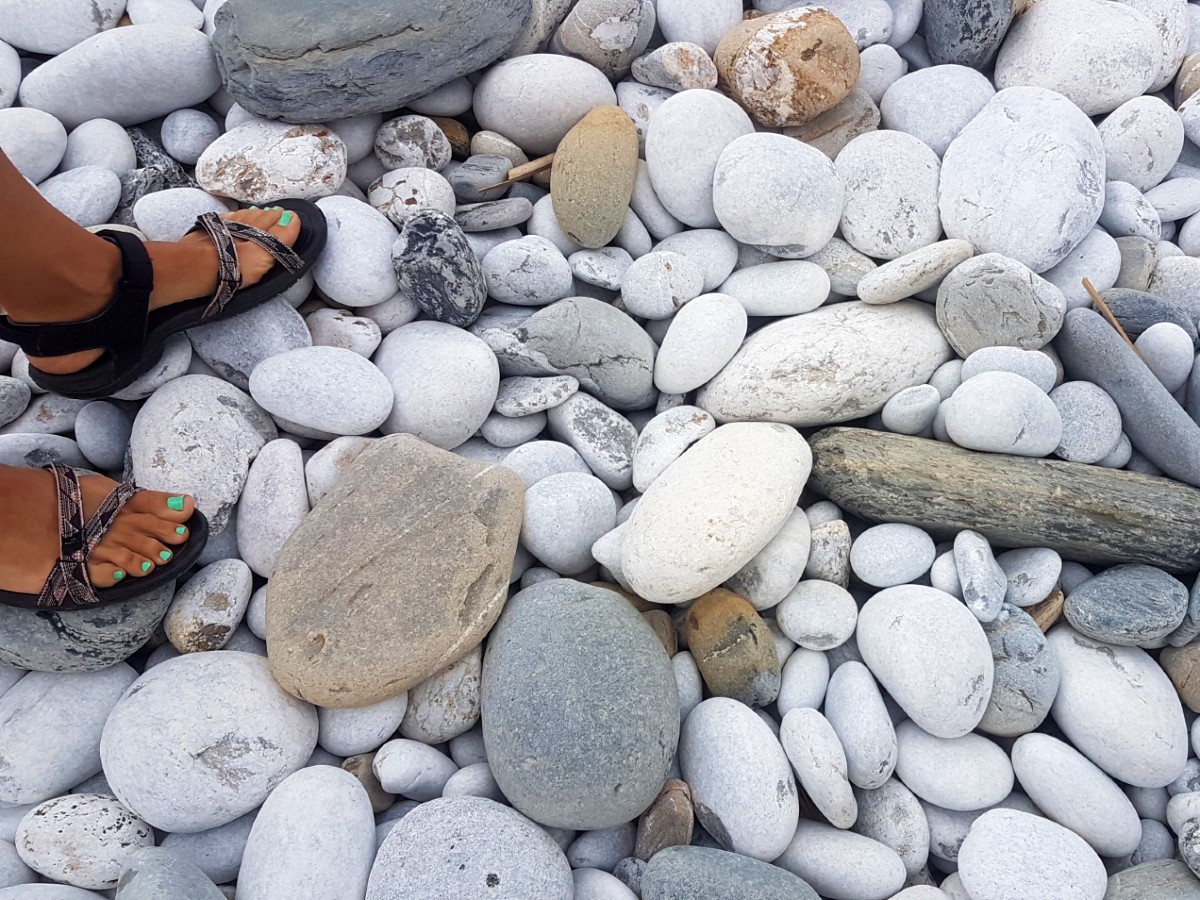
If you prefer to wear closed shoes, lightweight trainers or summer running shoes are ideal. I was happy to have proper hiking shoes when we hiked to Kleftiko Bay in Milos Greece, but other than hiking I only wear my Tevas in summer.
These suggestions are based on walking an average of at least 12-15 kms on a sightseeing day. I’m sure other ladies will have different preferences – please share them in the comments!
Also, a pair of flip-flops will always be handy for the beach. These are easily available in Greece as well so you can get them here.
Can I wear high heels in Greece?
As mentioned earlier, most of Greece is full of cobbled streets, uneven pavements and tons of stairs. So, to put it simply, high heels are quite useless during your Greek holiday.
At the same time, it’s best to avoid flat sandals with very thin soles. As they offer no support, your feet will end up hurting on our cobblestone streets. I’m not sure if Ancient Greeks found Greek sandals comfortable, but in my experience they are not all that great!
Again, the best shoes are the ones that you are comfortable walking in.
Instead of heels, you can consider bringing a pair of wedges, platform shoes, or something similar. Just make sure that they have a sturdy sole. Walking in Greece gets worse if you’ve had a cocktail or an ouzo too many!
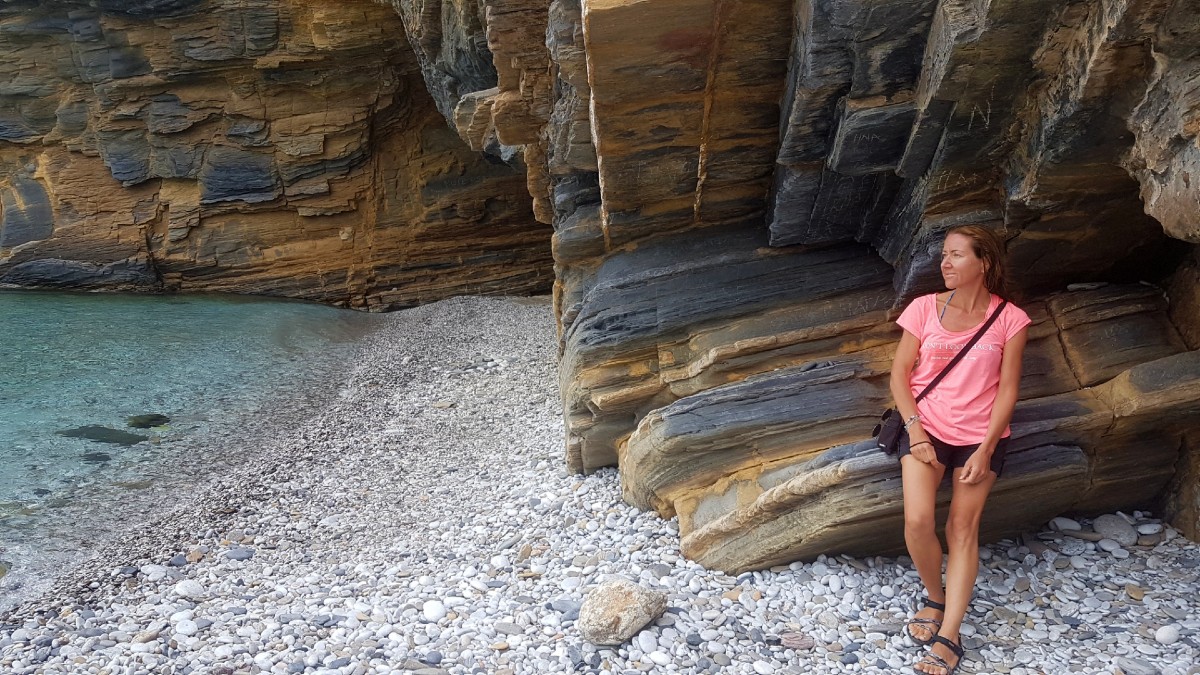
Hidden Peloponnese beach in September
Best shoes for Greece for men
Let’s face it, men are usually less fussy when it comes to choosing shoes for a Greek trip, or for any trip.
Just bring your favourite pair of comfortable, season-appropriate walking shoes. Also, bring a pair of flip-flops or other shoes that you can wear on the beach.
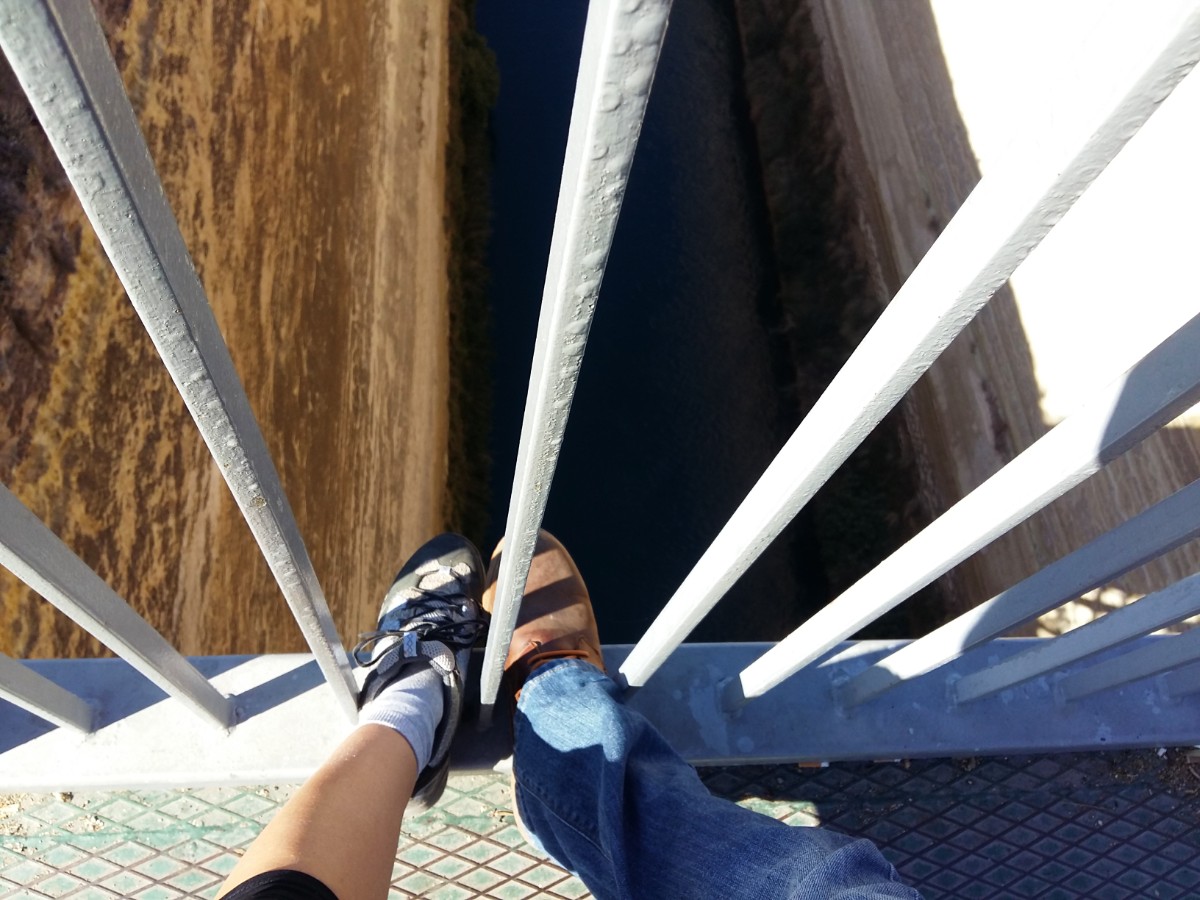
I should point out here that many visitors swear by water shoes. These are ideal for our pebbly beaches, as you won’t hurt your feet while trying to go into the sea. They will also protect you from any sharp stones or sea urchins.
Bring a hat and sunglasses
The first things you will need in Greece in summer are a hat and sunglasses – and not just for your beach days.
A good pair of sunglasses is essential to protect your eyes from the strong sun reflecting on the white marbles in the archaeological sites, or our white sand beaches.

Kalamata, the Peloponnese in late September
If you have a favourite hat, bring it with you. Or you can easily get a hat everywhere in Greece for 10-20 euro.
Some people might prefer large straw hats or otherwise wide-brimmed hats. Just be mindful when the strong Meltemi winds appear, as they can easily be blown off.
Tip: Don’t worry too much about whether wearing a hat will make you stand out as a tourist. It’s more important to avoid a potential sunstroke and your face going pink. Plus, you will notice that many Greeks wear hats too.
How much to pack for two weeks in Greece in summer
How much to pack is really up to you and how you prefer to travel. Some people like to travel light and do some washing now and then, as clothes won’t take long to dry.
This is what we do. We find this a lot easier than having to lug around a large case full of dirty clothes. Plus, we’ve found that most hotels / rooms we are staying at will do a proper wash for us.
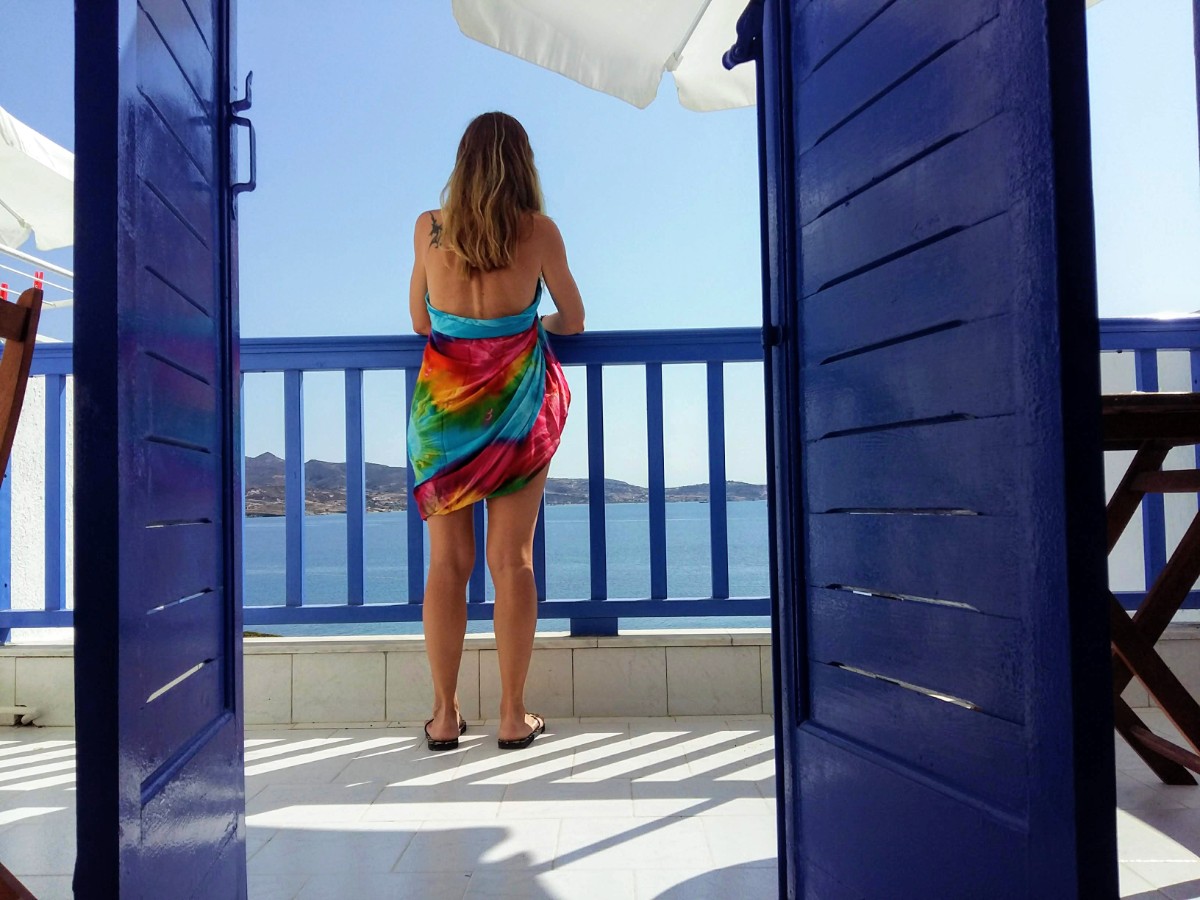
Milos in June
Other people prefer to pack a lot more than they are likely to need, just in case. This way, they will always have a choice of what to wear in Greece.
I understand that not everyone wants to wash clothes during their holidays. However, heavy luggage can be very impractical, especially if your hotel has lots of stairs or if you are changing hotels every few days.
All in all, it’s really best to pack light enough so that you are comfortable with your luggage, particularly on the islands. Then on the way back you can fill the empty space in your luggage with Greek souvenirs!
Two weeks in Greece with hand luggage
If you are visiting Greece in summer, you can easily get away with hand luggage like we do. That said, everyone is different, so we are offering options for any type of trip.
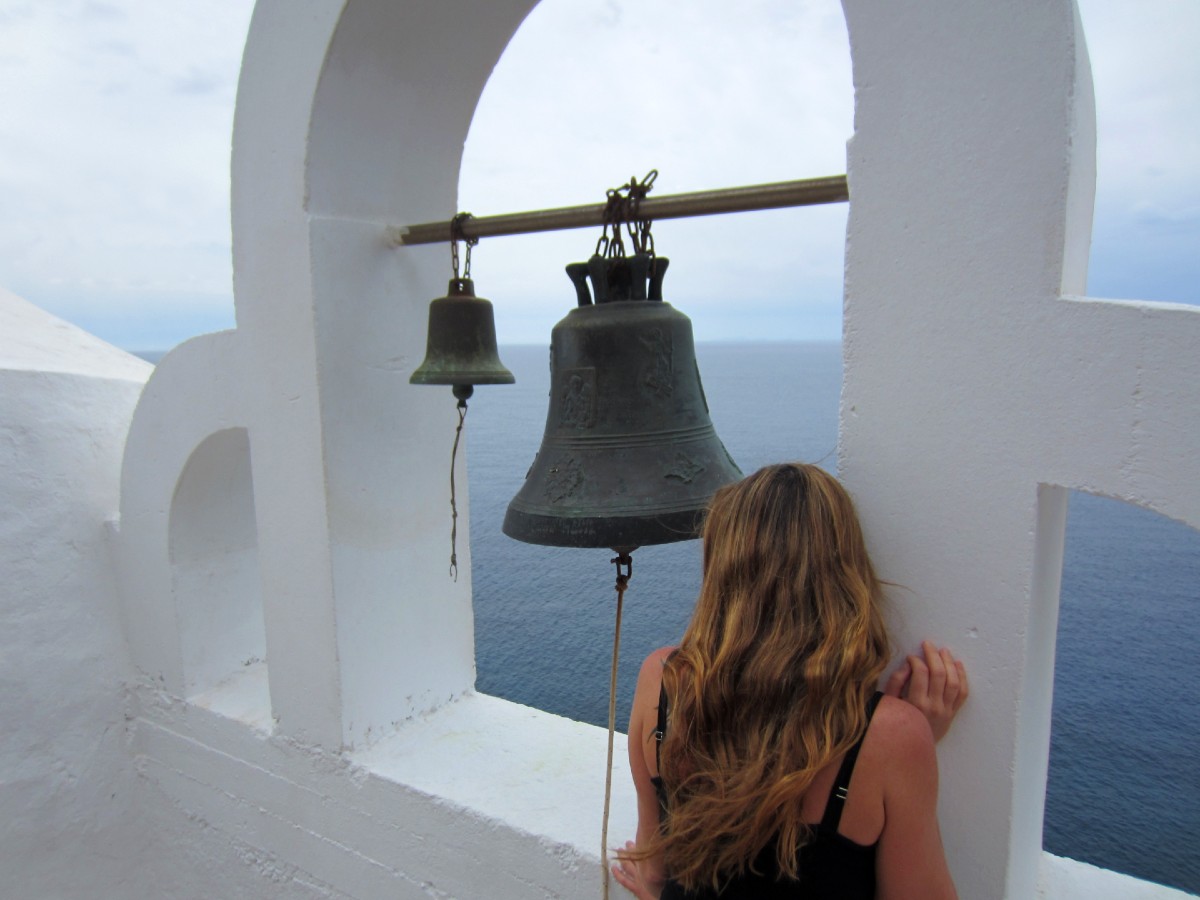
Secret place in Laconia in June
Here are the clothes that we normally take with us for two weeks in Greece in summer, or longer. In fact, we often don’t use all of these clothes!
For context, our days tend to be a mix of sightseeing, relaxing on the beach, swimming, snorkeling, hiking, and having lovely Greek meals. We also prefer quiet places over touristy destinations, and are not interested in wild nightlife. Well, not anymore 😀
Women’s Greek packing list for two weeks
This is what my summer packing list for 2 weeks looks like:
- 4-5 tank tops
- 4-5 t-shirts
- 2 pairs of rayon shorts
- 2 short skirts
- 1-2 long skirts
- 4 evening dresses
- 1 light jacket
- 4 bikinis
- 5 pairs of underwear
- 2 bras
- 1 fleece jacket (for the ferries)
- At least one pair of leggings (for the ferries)
- 2 pairs of my Teva sandals (more on shoes below)
- 1 pair of flip-flops
- 1 wide-brimmed hat
- 1 sarong (rarely used)
As we usually travel with our own car, I might bring a couple of extra clothes so that I don’t have to wash them too often. But they always fit in a carry on 🙂

Close to Kalamata, the Peloponnese, in September
My personal travel gear always includes my mask, snorkel and fins. Ok, I know the fins sound like a bit of an exaggeration, but I love swimming and snorkeling in Greece. We may not have the most colorful fish on the planet, but the water is crystal clear!
Men’s packing list for two weeks in Greece
Dave is a really light traveler, especially on his cycling tours of Greece. So he travels with this list of items, at the most:
- 5 t-shirts
- 1 dressy shirt
- 2 pairs of cargo shorts
- 1 pair of jeans (rarely used)
- 1 swimwear
- 5 pairs of underwear
- 5 pairs of socks
- 1 fleece jacket (for the ferries)
- 1 pair all-purpose walking shoes
- 1 pair flip-flops
- 1 hat
As long as he washes his socks himself, I don’t mind how many pairs he brings!
What if I don’t want to wash clothes?
I get it – when on holiday, you really don’t want to have to do any chores. In this case, you need to calculate how many days you have, and allow for a couple of extra outfits.

A very windy spot in Ithaca in July
In this case, you should bring at least one t-shirt and pair of underwear per day, a few pairs of shorts or other lightweight clothing, plus a few evening outfits.
As you realize, this packing list could get quite long. This is why I strongly encourage you to wash some clothes now and then.
Remember that if you need a certain item, you can always get it here. We have thousands of cool shops and boutiques all over the country, and you’ll have a nice souvenir!
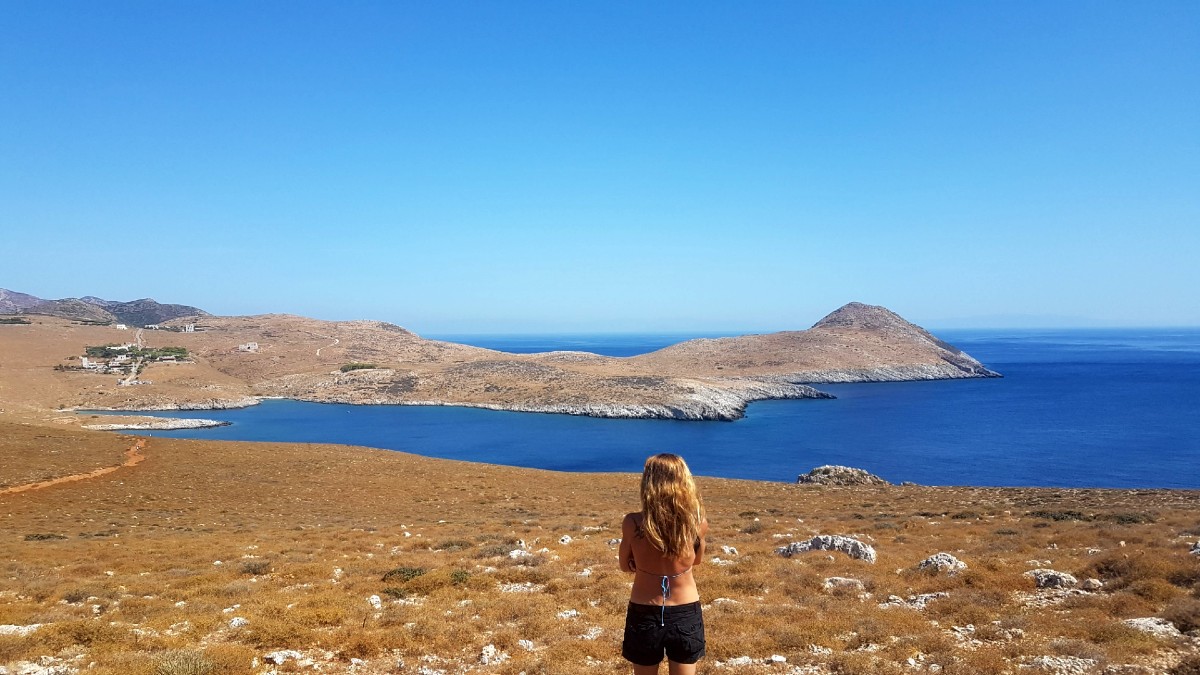
Hiking to Cape Tainaron, South Peloponnese, in September
Here are some more ideas for souvenirs from Greece.
Beach towel
If you visit Greece in summer, you will need a beach towel – it will be useful on the beach / pool, but also if you go hiking. Some visitors prefer to bring travel towels, which are much lighter and take up less space in your luggage.
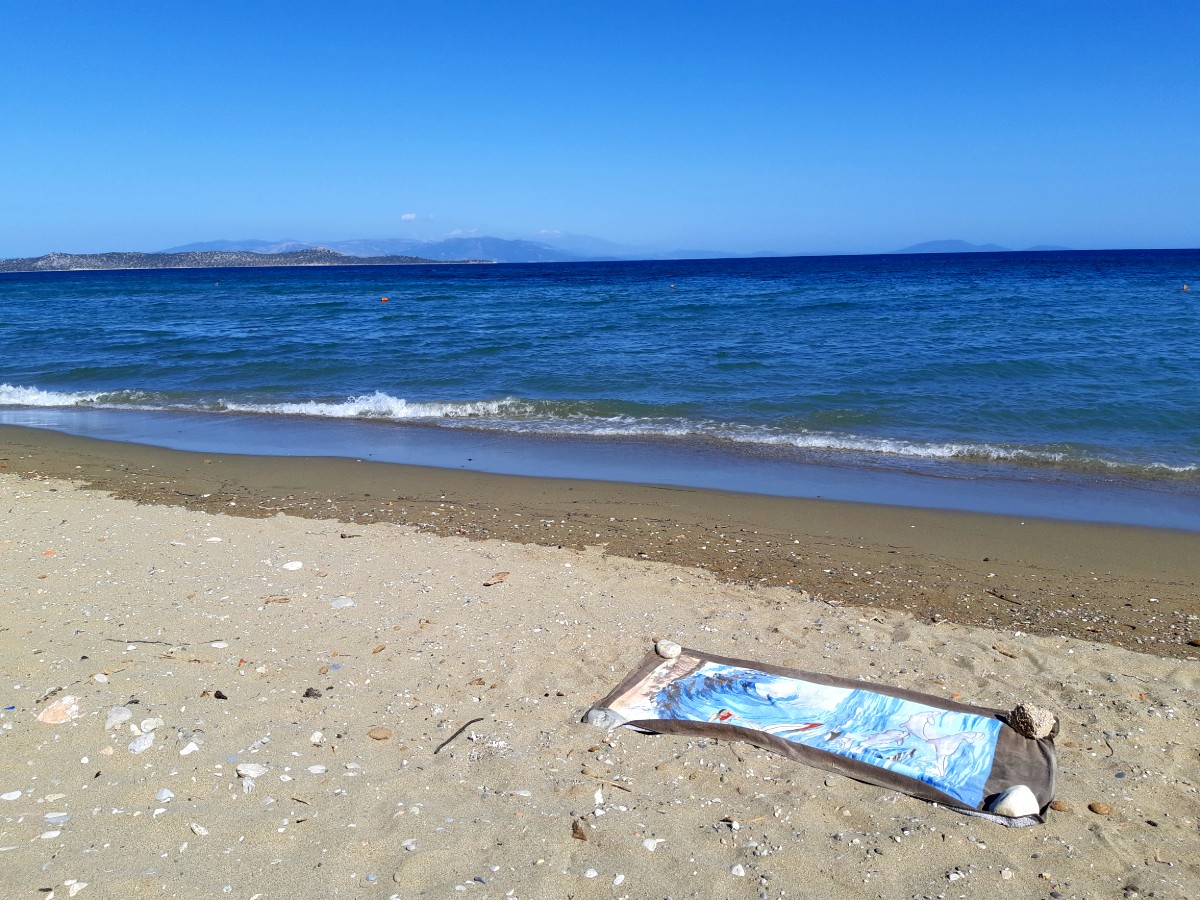
So that’s it for summer! Just a few light clothes and a couple of warmer items, and you’ll be fine. How about the shoulder season though?
What to pack for Greece in the shoulder season
The shoulder season in Greece are the months of March, April, early May, late September, October and November. The weather can be hit and miss, and packing can get a little tricky.
What to wear in Greece in March – What to wear in Greece in October
People visiting Greece in the shoulder season usually pass by Athens. Here is what Athens weather looks like then.
In March, our highest temperatures can exceed 25C / 77F, but it can get as low as 6C / 43F, and even lower some years. October is slightly warmer, with the lowest temperatures dropping to around 10C / 50F.

Athens in October
For these months, make sure you bring some warmer clothes that can be worn in layers. Some long-sleeved t-shirts and a cardigan or other light jacket are essential, and I would suggest bringing a heavier overcoat as well.
March and April are too cold for most people to swim comfortably. On the other hand, if you are visiting in October, definitely throw in your swimsuit. You might get some lovely, sunny days, and the sea is still warm after a long summer.
Related: Warmest Greek islands in October
November is generally colder and rainier, but there are still plenty of sunny days. Bring a mix of clothes that you can layer, including a warmer overcoat.
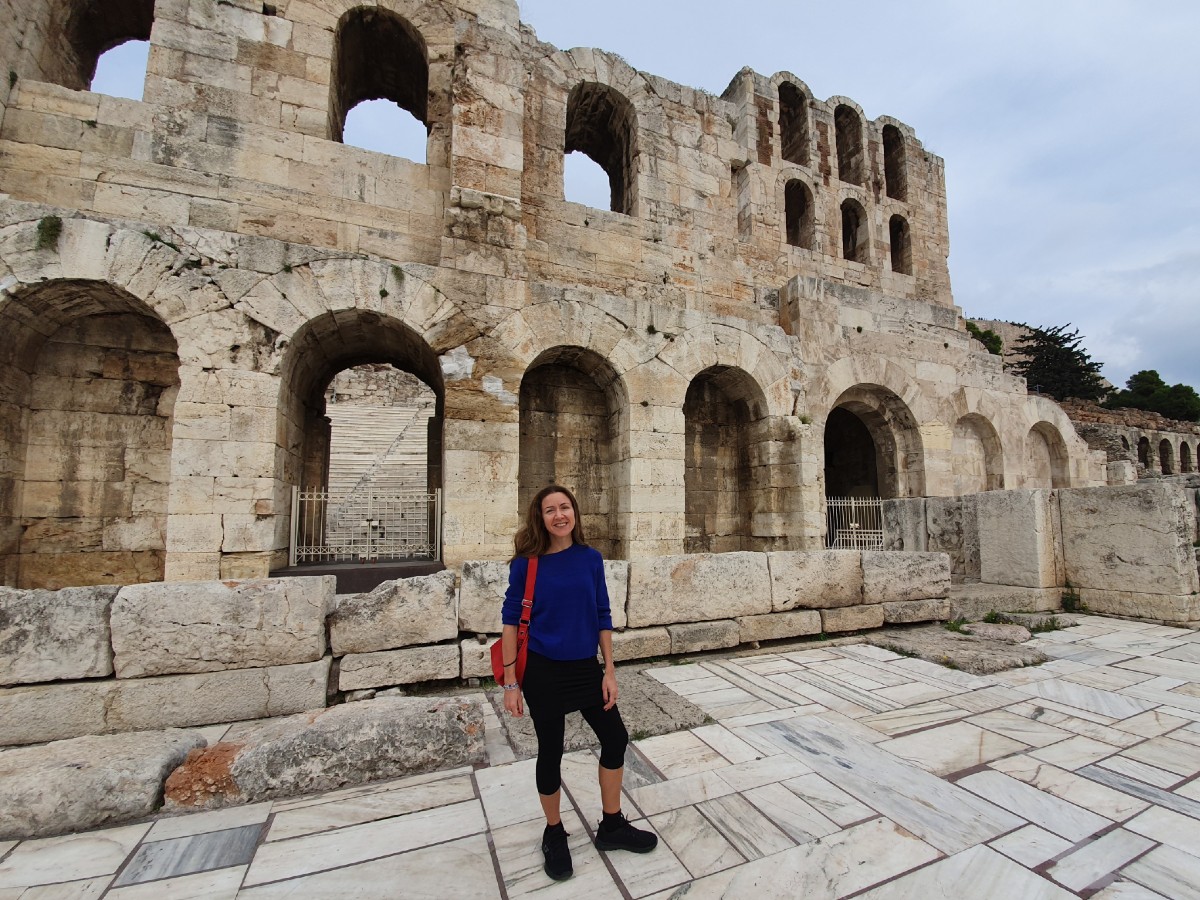
In terms of shoes, I personally suggest comfortable trainers like Skechers or any other similar brand. I’ve heard that Hokas are great, but don’t own any myself.
Note that simple trainers aren’t so suitable for challenging hikes, as they’ll be destroyed in very little time. Here’s the proof!
To be honest, these are some of my very old Skechers that I wore when hiking to St John’s cave in Iraklia, as I knew they were close to the end of their life. I’m glad they survived until the end of the hike or I would have been in trouble.
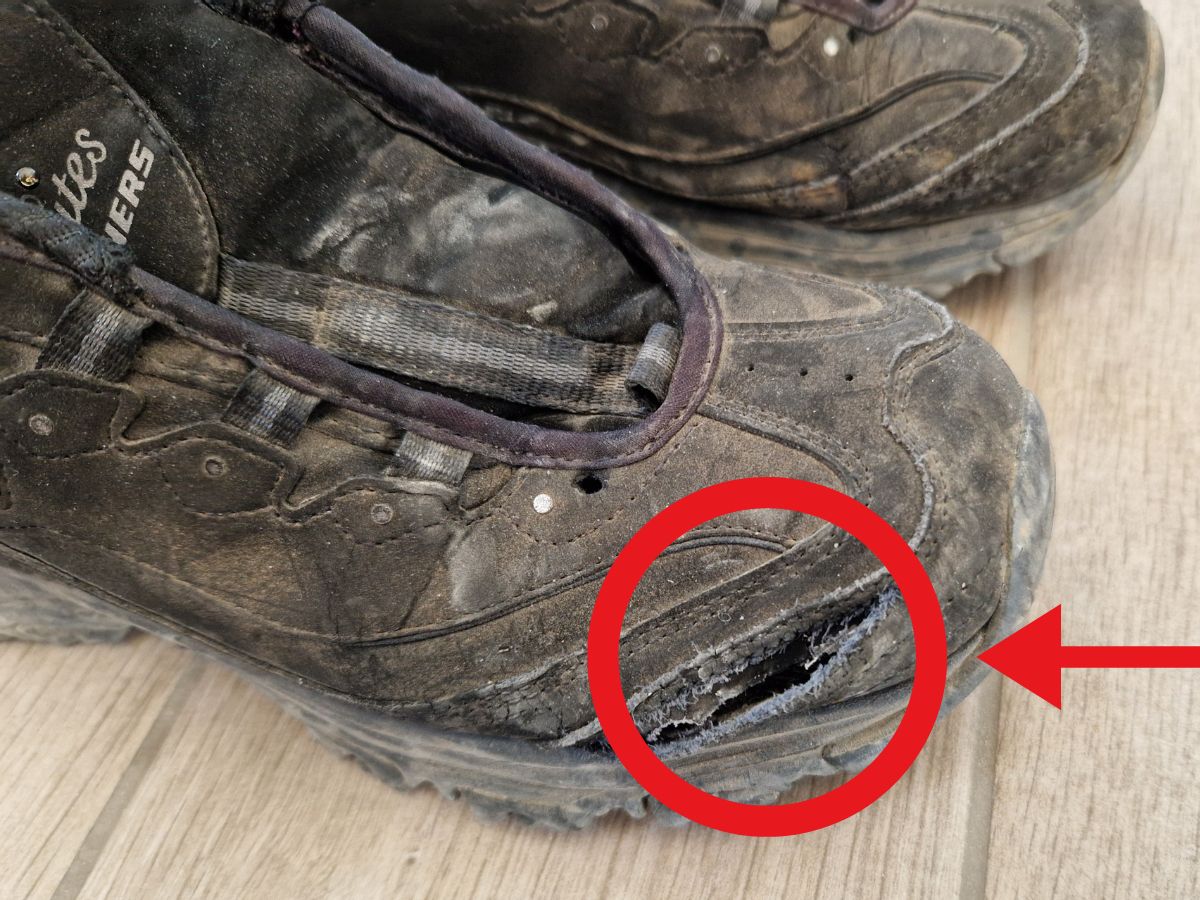
What to wear in Greece in April or May
April and May are two of the best months to visit Greece. People who like outdoor activities, like hiking or cycling, will appreciate the mild temperatures and blooming nature.
While some people will be happy to swim, others will find it too cold – however, it doesn’t hurt to bring a swimsuit. That said, you will need a warmer jacket for most evenings.
If you are planning your trip to Greece during those months, check my article on Greek Easter.
What to pack for Greece in September
September is another great month to visit Greece. On most days, you’ll get nice sunny weather, and the sea is much warmer than in spring. So, definitely bring your swimsuit and beach gear, but make sure to pack a few warmer clothes for the evenings.
What to pack for Greece in winter
Winters in Greece are fairly mild, compared to most other countries in Western Europe. Still, they are not exactly warm.
The coldest months in Athens are January and February, when we often get sub-zero temperatures and maybe snow.

Athens, 16 February 2021!
If you are visiting Greece in winter, bring with you some warm clothes. Again, it’s best to bring layers, starting with basic long-sleeved or thermal t-shirts, and then adding on to that.
In Athens, I normally wear a light thermal t-shirt, a cardigan, and an overcoat on top. Northern Greece can get a lot colder though.

Athens in February
Unless you are going skiing or hiking, technical clothing isn’t really necessary. That said, if you own a warm, waterproof jacket, by all means bring it. Alternatively, a waterproof shell coat might come in handy.

Athens in January
Finally, bring a scarf or neck warmer – you’ll find it useful for those chilly nights. And don’t leave your sunglasses behind, as you may get some incredibly sunny days.
Best shoes for Greece in winter
In terms of winter shoes, I’m all up for leather boots. However, I find that hiking footwear is a lot better for sightseeing around the ancient ruins. So I recommend waterproof, anti-slip hiking boots like Merrells or Salomons.
Some of our pedestrianized areas can get very slippery in winter. Pay extra attention if you are going to our ancient sites, like the Acropolis, on a rainy day.

Close to Metsovo, Northern Greece in February
Even if you are not visiting the monuments, make sure that you bring comfortable shoes with thick soles and good cushioning, that are suitable for long walks on our cobbled streets. Otherwise, your feet will hurt at the end of a long day.
Personal items to pack for Greece
So now that we’ve covered the basics, let’s check out what else you need to pack for Greece. These can roughly be divided into five categories – toiletries, medication, electronics, luggage, and other personal items.
What toiletries should I bring to Greece?
You can easily get most types of toiletries everywhere in Greece. This includes supermarkets, mini markets, cosmetics stores, pharmacies and many souvenir shops.
Any hotel room will typically offer some form of shower gel and shampoo. More upscale establishments will also offer other products such as body lotions and dental hygiene kits.
Sunscreen with UV protection is a necessary item for Greece. It is widely available all around the country, at any time of year.
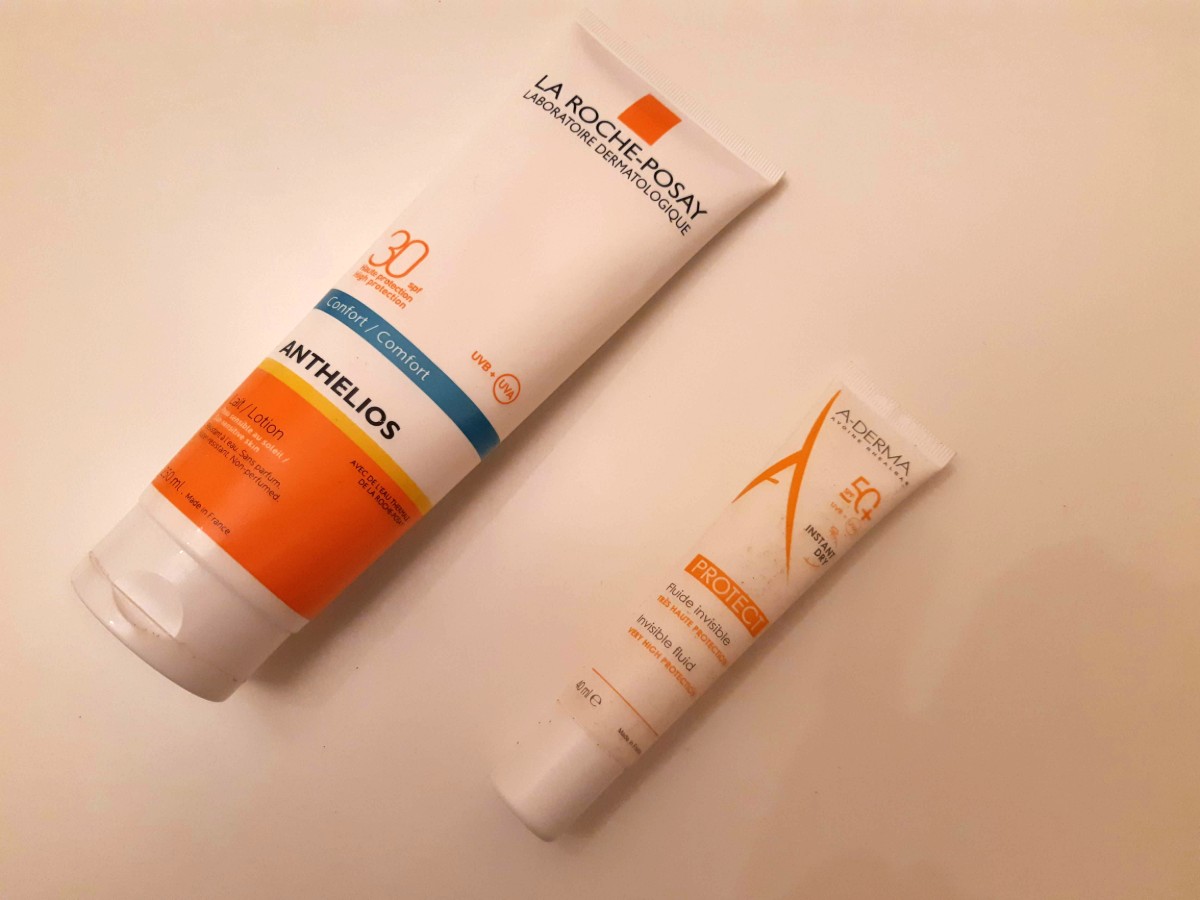
It tends to be more expensive on the islands and touristy places, so you would be better off buying it in Athens. As an indication, a 50 SPF pharmaceutical brand would cost around 10-15 euro (250 ml bottle).
Mosquito spray is also easily available everywhere in Greece. Don’t worry though – unlike Asia and South America, mosquitoes in Greece are very rarely dangerous. For the most part, they are just a nuisance. Here’s how to avoid mosquitoes in Greece.
In terms of makeup, it’s really up to you. But remember that our climate is very warm. If your makeup is designed for colder weather it might not keep very well. Many women will find that mascara and lipstick are more than enough.
Finally, if you are traveling from the US, washcloths are not a thing in Greece. In fact, I never knew they existed until I read about them in a travel forum. If it’s something that you need, please bring your own.
Can I bring medication to Greece?
Overall, Greece is fairly relaxed with medication laws. You can buy many pills over the counter, though antibiotics need a prescription.
Pharmacists are very knowledgeable overall, and they should be your first contact point if you develop any health issues. They will usually be able to provide you with some medication, though they might sometimes refer you to a health center.

You can safely bring with you over-the-counter medication such as common painkillers. If your medication doesn’t need a prescription but is uncommon, you might want to check if the substance is allowed in Greece.
As an example, codeine isn’t allowed here, unless accompanied by a prescription.
If you need to bring your prescription medication from home, just get a note from your doctor. It’s also best to keep it in its original packaging.
It’s very unlikely that you will be checked, but it’s better to be safe than sorry. I’ve never, ever heard of someone whose medication was confiscated or even questioned at the airport.
If you are taking the ferries in Greece, you could consider bringing some sea-sickness pills. Besides the traditional Dramamine pills, you can consider getting ginger tablets, which won’t make you drowsy. Of course all of those are easily available in Greek pharmacies as well.
Finally, if you have any allergies to gluten, nuts etc, make sure you bring your EpiPen! Also, check out my article on ordering food in Greece, where I’ve included a ton of info if you are allergic to common allergens.
What electronics should I bring to Greece?
No one travels without electronics anymore. Most people will have at least their phone and perhaps a camera, while others may have several different gadgets. This choice is personal and it depends on what you are planning to do in Greece.
If your only camera is your smartphone, all you need to bring is your phone charger and maybe a converter. Consider bringing a couple of extra memory cards, especially if you are here for long.

If taking photos is one of your passions, you will probably want to bring your camera and lenses. Make sure, however, that you can store them safely when you go on a sailing trip or the beach.
A waterproof case is often recommended for your electronics, though I’ve never found it necessary myself. However, I like using an underwater camera sometimes.
If you have many electronics, consider bringing a power bank / portable charger. The most compact ones will be good to charge your phone once or twice, and they are a good backup in between charges.
If you are coming from outside the EU, check if you need a travel adapter. If you haven’t got one, you can get one at the airports in Greece, or at bigger electronic stores. Try asking at your hotel too, as someone may have left one behind.
Finally, if you are planning to read a few books during your holiday, don’t forget your Kindle. With that said, do not dismiss paper books, which you can always exchange or leave behind. Plus, if they get wet, they will just dry up! Even better? They never run out of power!
What type of luggage should I bring to Greece?
This is the million-dollar question. Should I bring a backpack or a wheelie? Should I travel with a carry-on, or allow for a bigger-sized suitcase?
Again, there is no right or wrong answer. Just use the style and size of luggage that you feel most comfortable with. Remember, however, that carrying a heavy suitcase with wheels can be rather impractical.
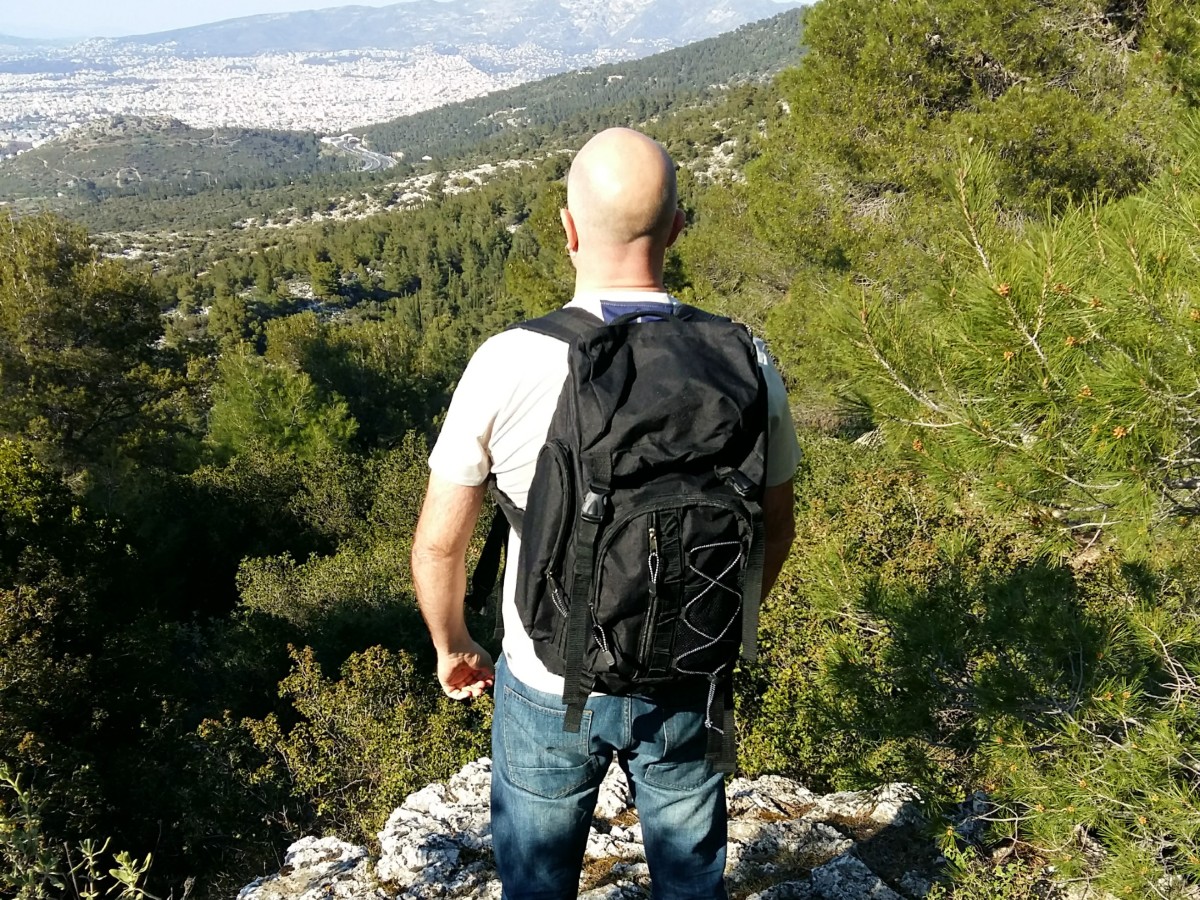
That said, backpacks are not for everyone either. If you have back problems, of cannot carry a backpack for any other reason, it’s best to avoid them.
As for us, we generally prefer smaller-sized backpacks which are rarely over 8-9 kilos each. It’s just that we simply find it easier to travel with less. If we can do it, you can do it too!
To keep your clothes tidy and organized, you can use packing cubes. I’ve been using these lightweight containers for a couple of decades now and I find them super useful!
Daypack for Greece
And now, let’s have a look at your daypack or handbag.
Many articles advertise expensive travel daypacks, with hidden compartments and anti-theft properties. While I’m sure many people find those useful, I use the same, no-name, modestly priced items everywhere, whether in Greece or abroad.
In my opinion, a cheap, light backpack is great. This is where you can keep your water bottle, paper books, case for sunglasses, sunblock, and other items like toilet paper, band-aids etc. It can also double as a beach bag.

In addition to the day pack, you might find that an anti-theft cross-body bag is useful. This is where you could keep a small amount of readily available cash, maybe a travel card, and your phone or camera.
But what I would definitely suggest, especially if you are visiting Athens, is to get a money belt or neck wallet, where you can keep your passport, credit cards and any larger amounts of cash.
This is not to say that Athens is a particularly dangerous city in terms of petty theft. However, a few incidents have been reported in the last few years, especially in tourist areas and the airport metro.
Pickpockets are generally very skilled, so you may not realize that you’ve been robbed until much later. And, even if you have travel insurance, it’s much better to avoid getting robbed in the first place. Here are some tips on how to avoid pickpockets in Athens.
FAQs about packing for Greece
Here are a few more questions people ask when preparing for a Greek vacation:
What should I pack for 2 weeks in Greece?
Assuming you are visiting in summer, the ultimate Greece packing list should include a few t-shirts, shorts and skirts / dresses for the ladies, 5-6 pairs of underwear, a warmer jacket and a couple of pairs of shoes.
How much money do you need for 2 weeks in Greece?
Being budget travelers ourselves, we usually travel outside the peak season. Our budget has never been more than 50 euro per person per day, including all our accommodation, transportation, food and sightseeing costs. Most people should allow for more, especially if they are interested in any tours.
How much cash should I take to Greece?
These days, you can pay for almost everything by debit or credit card. However, I recommend that you take with you a couple of hundred euros. They can be useful for tips, taxis, and buying souvenirs from street vendors.
Can I use my debit card in Greece?
You should be able to use your debit card in Greece, but it’s best to check with your bank before your trip.
Can I use dollars in Greece?
Greece is a European country, and our currency is the Euro. Though some Greek people might accept dollars, they are not preferred, and you may be offered a very bad exchange rate if you insist on using them. Please have some euros with you.
Can I drink the tap water in Greece?
This depends on where you go. For example, you can drink tap water in Athens, but you can’t drink it in Santorini. If you want to avoid plastic waste, consider bringing a portable water filter. Have a look at this guide: Can you drink tap water in Greece?
Our final tips for your Greek holiday
Packing for a trip is one of my favorite activities, as it sets the mood for our upcoming travels. At the same time, many people find packing for a trip abroad quite stressful.
It’s understandable, as you never know what the weather will be like. But also, and perhaps most importantly, most people don’t want to stand out as tourists.
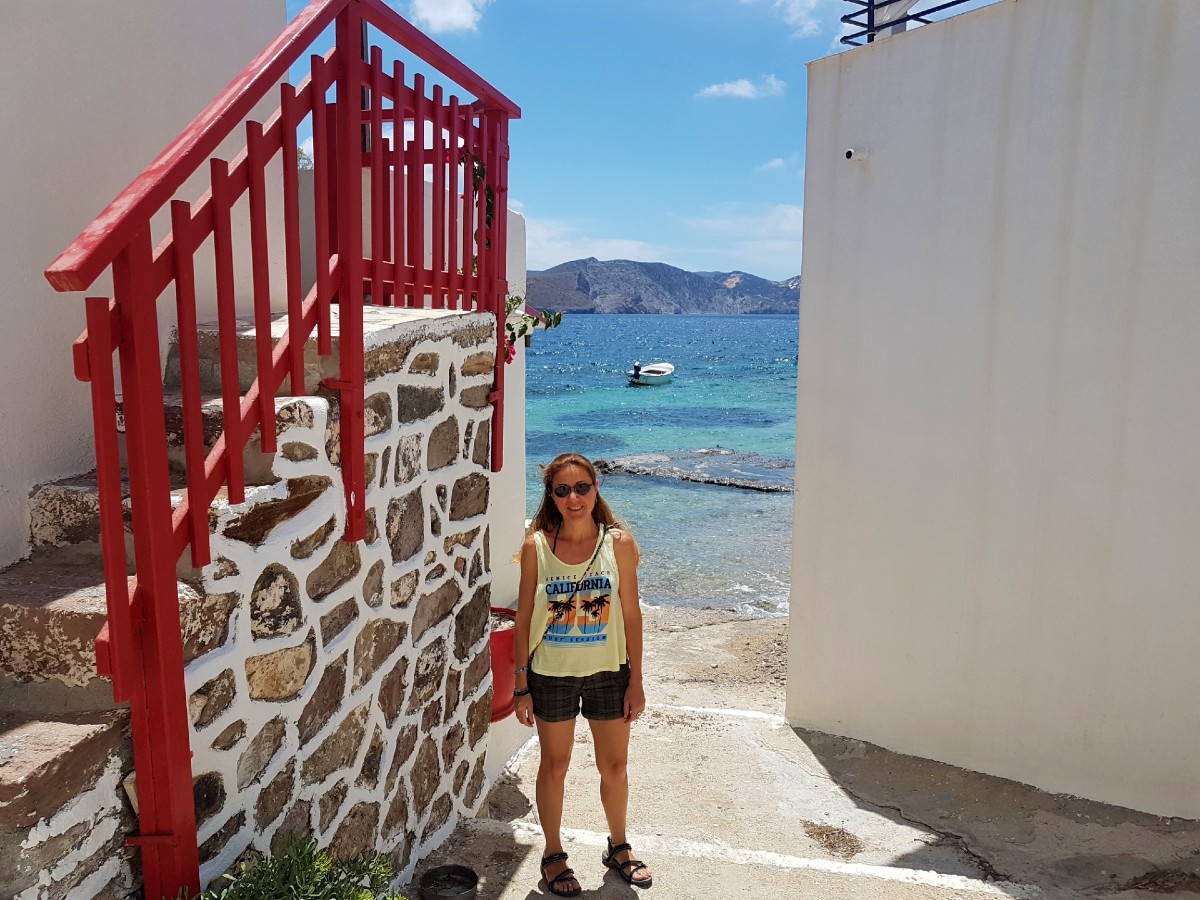
After several years of frequent and long-term traveling, I’ve come to a couple of conclusions.
First – in most countries, you will stand out as a tourist, no matter what you wear. It will either be your facial features, your height, the way you look / speak / walk, or something else. So, just wear something that is weather appropriate and you feel comfortable in.
If it makes you feel better, I’m always mistaken for a tourist in my own country. Most people are very puzzled when they hear me speak Greek fluently! It used to annoy me, but I find it very amusing these days.
Second – if you have forgotten to bring something, you can usually buy something to replace it with. Sure, a few things like your smartphone are irreplaceable. It’s unlikely, however, that forgetting to bring your bottle of new perfume will spoil your holiday.

And with this in mind – ladies, leave your hair straighteners and hair driers behind. Yes, Greece is one of the best places to let your hair down!
More Greece travel tips
I hope this extensive guide on what to pack for Greece was helpful! Plus, you’ve now seen our travel wardrobe. If you have any questions, feel free to ask in the comments below.
Here are some more Greek travel guides:
- Itnierary for Athens, Mykonos and Santorini
- What to do in Santorini in 4 days
- Best time to visit Greece
- 30 best things to do in Athens
- Is Greece expensive? Our budget for a month
- Tips for staying cool in Athens and Greece
- Best things to do in Greece in January
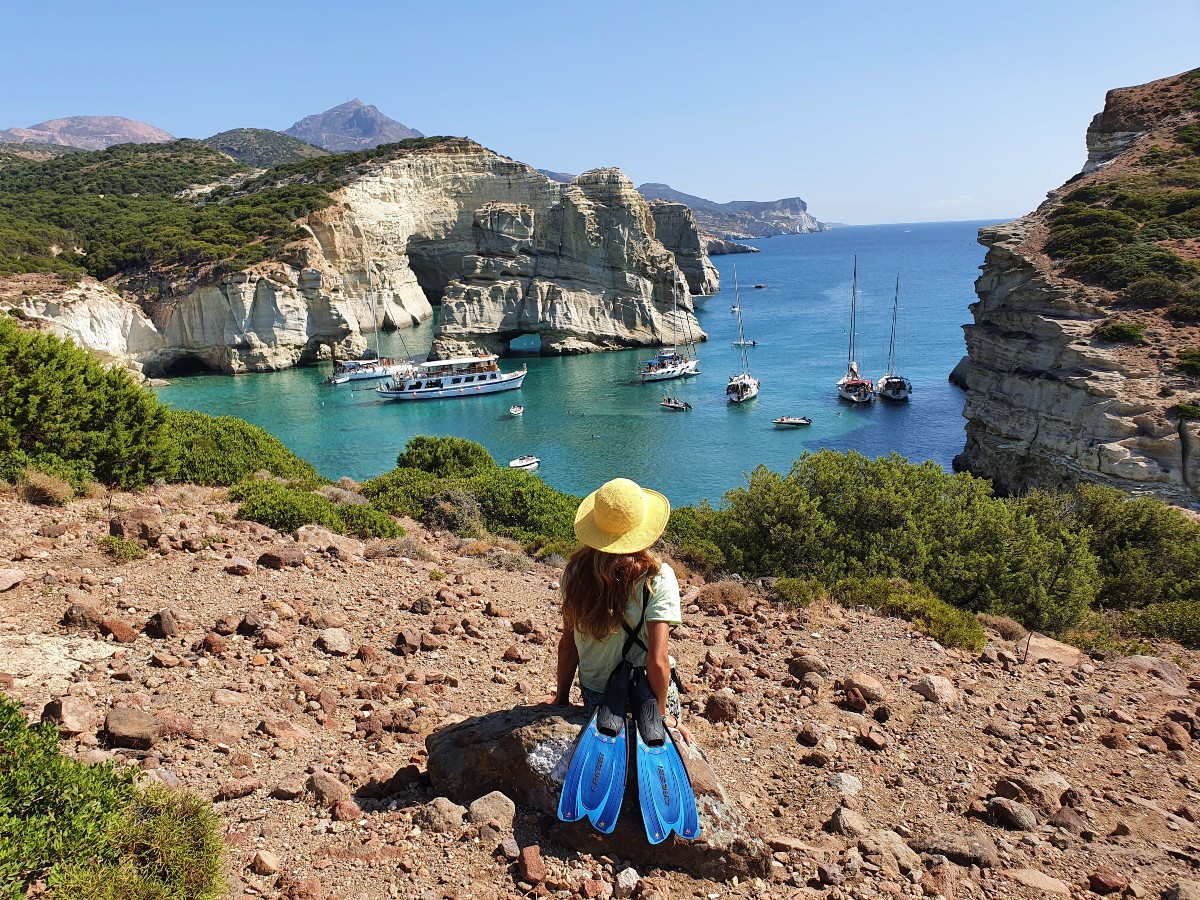 Hello! I am Vanessa, a travel writer from Athens, Greece. I’ve been to about 60 or 65 of the Greek islands and much of the mainland, and love travelling around my country and offering tips to visitors. Follow me on my social media:
Hello! I am Vanessa, a travel writer from Athens, Greece. I’ve been to about 60 or 65 of the Greek islands and much of the mainland, and love travelling around my country and offering tips to visitors. Follow me on my social media:
- Facebook page and our very active Facebook group
- Amazon


Thanks! So much. I was looking for info on what to wear on april and was very happy to find your great article. I had to postpone my Greek vacation since december 2019 because of the Covid situation i live in Puerto Rico. I hope i can visit this year. We are not sure how the omicron thing will be on april 2022 but we are thinking on going that month or in july (but we know it will be more crowded and expensive).
Thanks again for all your info on greek culture and travel.
Thank you, a really well detailed article especially on the footwear. This helps a lot with my choice of items to take.
Glad I could help! I’m currently in Rhodes and am SO glad I’ve got my Skechers… Enjoy your holiday!
Great article! Your recommendations and information on Greece are very helpful. My first European trip from the US. Thank you.
So glad to hear that! Feel free to get in touch if you need any further info!
What do you think about navy linen separates in late March early April in Nafplio/Crete/Athens? PLMKWYT
Hi, thanks for your question! It really depends on what sort of weather you are used to… Nafplio and the coastal areas of Crete can be nice and sunny during the day but very damp in the evenings, I would personally bring an overcoat or warmer jacket just in case.
Hello. Thank you for the valuable information. I wonder what is. The transportation like in Greece? Is it mostly public transportation? Uber? Or…? Thanks
Hi, which areas are you referring to? For example, there are multiple options in Athens, have a look: How to get around Athens. Generally speaking, there are ferries, long distance buses, taxis, transfers. Have a look at this article too with useful apps to download before your trip
Thank you, thank you! I am experiencing packing anxiety and your list is helpful. Arriving in Athens last week in May then week in Paros. I am a confessed over packer but have vowed to do only a carryon suitcase. I am old and have never owned a backpack! Look forward to experiencing all your beautiful country has to offer!!!
No need for a backpack – a suitcase is fine if this what you are used to! I am sure you will be fine, end May / early June is on of the best times to travel in Greece! Enjoy!!
Thank you Vanessa. I visited Milos in the early 1970’s. It was so quaint and beautiful and had very few foreigners visiting. My husband and I had a marvelous and restful stay.
We are planning a trip to Portugal in March of 2024 and would like to add an extension to our trip in Greece specifically Milos. Our time frame in Portugal is March 11-19, 2024. Would you suggest we travel to Milos on our to or from Portugal? Any suggestions would be appreciated. We will be traveling from Phoenix Arizona.
Thank you
Gigi Lentz
Hello! I am jealous that you visited in the 70s!
March in Milos is very, very quiet – and definitely not swimming weather. So it depends a lot on what you are after – if you want to relax, it would be good! For that time of year I would personally recommend Crete or Rhodes, as they are bigger islands and more restaurants etc will be open. We were in Santorini a few days ago and it was hard to find somewhere decent to eat 🙂
All in all, it’s best to visit Greece towards the end of March, after Portugal, better chances of good weather!
Hi Vanessa!
We have a ‘girls’ trip to Greece in October ’23, 5 ladies for 5 weeks. It will be my first time back since 1976. One of the ladies has friends on Santorini, so we’re all set for accommodations, travel, some other island hopping, etc. We’re driving around the Peloponnese areas for the first 10 days, can’t wait! My question is just something simple – when I’ve traveled in Europe, I’ve usually found street vendors selling “Pashmina” (not real) long scarves at cheap prices. Does that still happen and are those available in Greece, so we don’t have to pack any from home? I love the ones I’ve gotten in Europe over the years. SO looking forward to seeing more of your wonderful country!! Thanks for any info!!
Hi – this sounds like a fab trip! You will definitely find pashminas in Santorini, Athens and most other places you are going to – you might find them at street vendors in some areas. Peloponnese is great, have a look at these guides that will help you plan your trip! Definitely visit Ancient Epidaurus, one of my favourite sites in Greece! Enjoy and feel free to send more questions!
Hi! My husband and I are traveling to Greece in February. We are thinking of traveling to Santorini, Andros and Tinos. I expect that it will be cold. Will restaurants be open? Do you have other suggestions for us?
Hi! I’m sending you an email!
I have read three helpful guide books as we prepare for our upcoming trip to Greece, but your wonderfully detailed website really fills in some gaps (gaps that I did not know existed! Mosquitos! Not to flush TP!) not filled in by guide books. Your language section and food sections are very informative too! Wow! You should think about a podcast or a putting out some youtube vids or publishing–you do a really great job. Thank you for your awesome well-written, well organized website. You should have a link so we can at least buy you a coffee (like podcasters do). Yia mas! Jul
Thank you so much for this lovely comment! Enjoy your vacation, and reach out if you have any more questions!